The road to fine coffee in Yunnan-the tide of fine coffee is changing Pu'er in Yunnan, which is famous for tea.
Professional coffee knowledge exchange more coffee bean information please follow the coffee workshop (Wechat official account cafe_style)
China Yunnan Coffee _ Yunnan small Fine Coffee beans _ Yunnan Coffee Bean Price
Not only the emerging boutique coffee shops in the city, but also the coffee industry in Yunnan Pu'er is transitioning from the instant coffee era to the third coffee wave. Starbucks, young coffee enthusiasts and boutique coffee brands all came to this small town in Yunnan with the determination to do a great job.
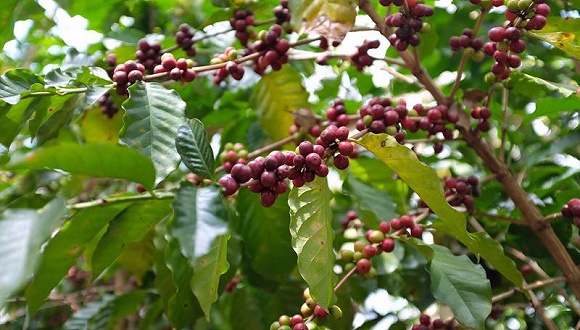
Pu'er City, Yunnan Province, Menglian County on the Sino-Myanmar border. Shen Xuejing was a little frustrated because the owner of the hill where she was now told her that the batch of coffee beans she had come to taste after a five-hour drive from Pu'er, 230 kilometers away, was gone. Shen Xuejing, a barista from Shanghai, took a course on the treatment of raw coffee beans in Pu'er last December.
Before going to the top of the mountain, she took out her iPhone and looked at the altitude here-- which is one of the key factors determining coffee growth-- and then looked at the surrounding geographical environment. "this batch of beans should be able to reach about 85 points in the SCAA (American Fine Coffee Association) system." Shen Xuejing said. Usually in this system more than 80 points, can become a boutique coffee.
There is no other way, Shen Xuejing can only return with regret. On the way, she met Ted Lingle, the founder of the World boutique Coffee Association, and people traveling with her told Shen Xuejing that they had also come for the beans. Behind them, there are also people from the CCTV documentary team who have just finished filming the film.
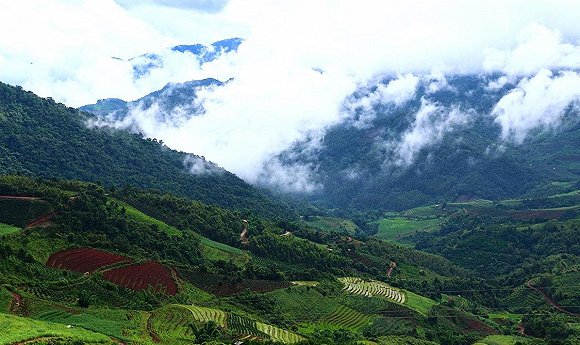
Menglian County, Puer City, Yunnan Province
Nanjing West Road, Shanghai, more than 2000 kilometers away. At the newly opened Starbucks Zhenxuan Shanghai roaster (Starbucks Reserve Shanghai Roastery), two large coffee bean roasters were operating freely, and the batch of coffee beans they were curious about were finally processed here.
This is a single-origin coffee bean from Pu'er in Yunnan Province, which is treated with yellow honey, which is more complex than conventional sun and water washing methods. It is also the first time that Starbucks has included Yunnan coffee beans in its high-end brand Starbucks Reserve product line.
Of course, there is no lack of marketing, and there is no doubt about the importance of the Chinese market to Starbucks. But in the field of boutique coffee, Yunnan coffee beans are usually mixed with other coffee beans. This time, big companies such as Starbucks' launch of single-origin Yunnan coffee beans under the high-end product line seems to be proving to the entire industry that Yunnan coffee is very different.
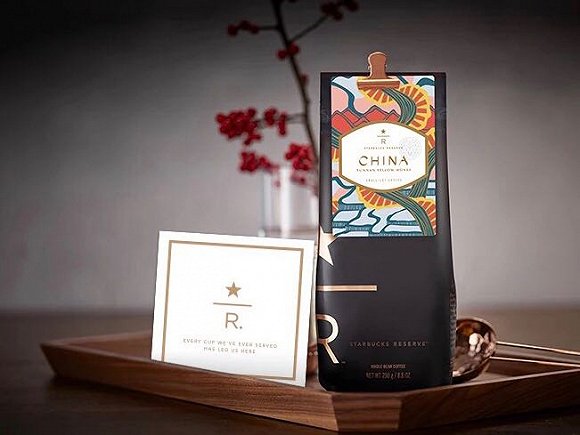
Starbucks Zhenxuan's first coffee bean from a single producing area in Yunnan
Pu'er also had coffee, so Starbucks came.
Li Xinhua, 45, also hopes to produce such boutique coffee beans.
Although he has only visited Starbucks once, he does not know how the so-called "third coffee wave" is spreading on a large scale. Driven by this wave, boutique coffee with a single origin, unique flavor and hand-brewed coffee is becoming popular all over the world.
He doesn't seem to care about it, but knows that boutique coffee can be sold at a higher price. Li Xinhua grows coffee beans on Pu'er 's 300-acre estate, and 90% of these beans are bought by Starbucks.
In fact, in addition to tea, Yunnan Pu'er also produces coffee. In 2007, Simao was renamed Pu'er because the Pu'er tea produced here was once famous in the market. But that doesn't stop local farmers from waning their enthusiasm for growing tea-in the year when the once-hyped Pu'er tea returned to rationality from high prices, a large number of tea farmers suffered heavy losses. So they began to cut down tea trees on a large scale to grow coffee.
Based on the market response, the Yunnan local government has also made plans to turn the local tea planting area into a stock market, ensuring that it will not increase at about 6 million mu by 2017. As a result, the planting area of coffee began to double.
In fact, there is no coffee variety in the native plant spectrum of China. In 1893, the English missionary Jingji introduced coffee to Yunnan. From then on, Yunnan also had the habit of growing coffee.
Today, nearly 10 to 140000 tons of coffee are produced in Yunnan each year, accounting for 99 per cent of China's coffee production. Pu'er accounts for 60% of the coffee production. Coffee growth requires certain climatic conditions, and the area of latitude 25 degrees north and south is usually called the "coffee belt"-where the soil, climate, rainfall, altitude and sunshine are suitable for coffee growth-including Pu'er in Yunnan Province.
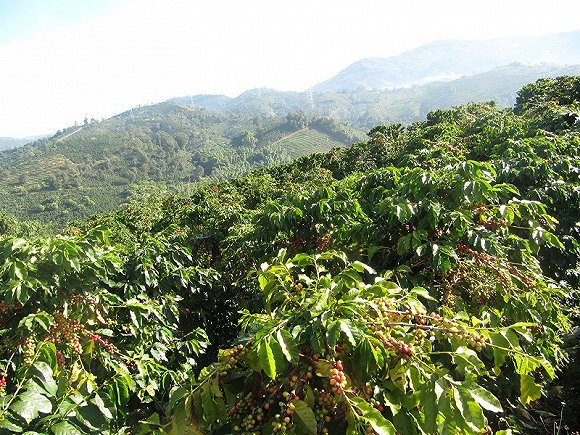
Coffee farmland in Pu'er, Yunnan
Li Xinhua's coffee-growing skills are pieced together.
Because when coffee was grown in 2007, the market had little demand for coffee quality. For a long time, Pu'er has mainly grown coffee beans needed by mass exchanges. These coffee beans will be exported to foreign countries for instant coffee production. In 1989, Nestle Coffee entered Pu'er and brought the Katim coffee variety.
This coffee variety meets the needs of Nestl é-stable and sustained high yield. The coffee buyer needs to get a lot of coffee beans here to produce instant coffee. The variety is highly resistant to disease, and Katim is still protected from a plant disease called leaf rust that makes other coffee varieties moribund.
During the harvest season, the way farmers handle it is also extremely simple and straightforward. Harvest all the fruits, whether they are ripe or not, which can increase the yield. At the same time, directly on the land for the sun, there is no special sun equipment, let alone the need to record coffee bean temperature, humidity and other data.
Such coffee beans will be bought at the price set by Nestl é with reference to international futures. For instant coffee, this mode of production is not fatal.
Although Nestl é has made an indispensable contribution to the development of coffee in Yunnan in the past 30 years, giving local farmers a stable source of income, this mode of production regardless of quality has also lasted here for a long time.
When Li Xinhua tried to sell coffee beans to Starbucks in 2014, he found that this approach didn't work.
The Seattle coffee brand entered Yunnan in 2012. It has set up a coffee grower support center here and set up Starbucks Love Coffee (Yunnan) Co., Ltd., a joint venture with local enterprises, to purchase coffee and carry out primary processing.
All farmers who want to sell coffee beans to Starbucks need to be certified by a Starbucks coffee and grower equity specification (C.A.F.E. Practices). This certification is evaluated by third-party organizations, including quality, social responsibility and environmental protection.
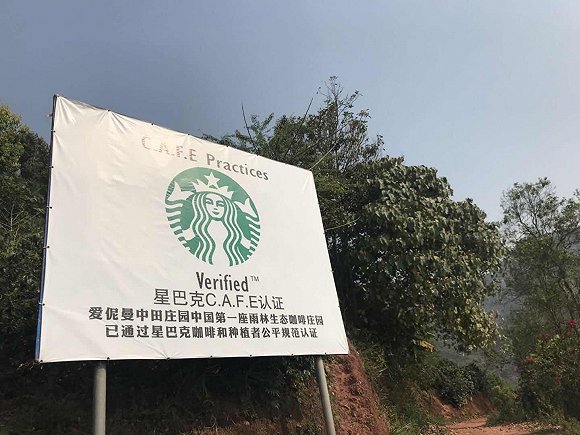
A coffee plantation certified by C.A.F.E. Practices in Pu'er.
But no one knows about Starbucks in Pu'er in 2012.
Tong Aaron is the director of Starbucks grower support Center. when he organized his first training in Yunnan that year, only 25 people came. He and the agronomist visited the manor and made an appointment to arrive at the manor, but the manor owner politely refused. Starbucks has launched a "high quality and good price" strategy in Yunnan-coffee beans purchased can be earned if they pass Starbucks tests, and additional rewards can be given if they exceed its conventional standards, such as large particle size.
"my purpose is simple, I want to receive good beans, and the purpose of farmers is also very simple, they want more income." He said.
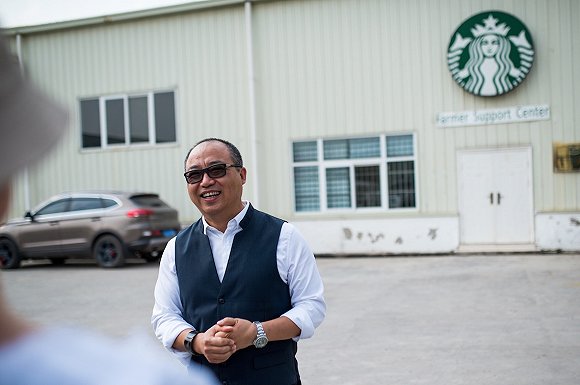
Tong Yalun, Director of Starbucks grower support Center
After hearing about this strategy, Li Xinhua took the initiative to add a pool for sewage treatment in his manor. Starbucks sent an agronomist to his estate to train him. Tell him that fertilizing before rain and before flowering can make the fertilizer ferment effectively, while the coffee fruit absorbs more nutrients and grows fuller, or pour quicklime into the pond for sewage treatment, because the waste water from coffee washing is highly acidic and can cause damage to the environment.
Starbucks agronomists will also advise local farmers to pick all-red fruit and plant shade trees next to coffee trees-to avoid being killed by the sun when the coffee trees are not yet ripe, and when they are molded, it can form a better microclimate around to help the fruit absorb nutrients.
When coffee farmers are certified, it doesn't mean that their coffee beans can be bought by Starbucks. A large number of trucks full of coffee beans line up to enter Starbucks' local factory every morning.
The agronomist will hold a sampler like a sharp steel pipe and sample bag after bag of coffee beans. Then sent to the inspection department of the factory, from the defect rate, particle size, flavor and other standards for testing. During the coffee harvest, each cup critic tastes 200 cups of coffee a day, while in peak times, up to 300 cups of coffee a day.
At present, there are 1678 coffee farms in Yunnan, with a total planting area of more than 16000 hectares.
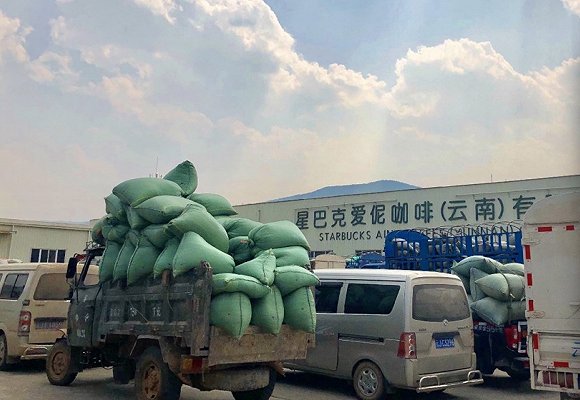
Local farmers' trucks are lined up in front of Starbucks' factory in Pu'er, Yunnan.
In 2014, Li Xinhua also passed Starbucks certification. And sold these coffee beans to Starbucks for 2 yuan per kilogram higher than the purchase price at that time. But in the worst-case scenario, if the beans are not approved by Starbucks, their fate is to sell them to other factories for 1 to 2 yuan below the market price-if costs are not well controlled, farmers are likely to lose money.
What Starbucks is doing in Yunnan is similar to the coffee company's marketing strategy in China. It uses the concept of coffee culture and the third space to make this country that used to drink tea begin to accept and fall in love with drinking coffee. In the upper reaches of this industrial chain, Starbucks is "making up lessons" for the industry.
In fact, Li Xinhua also knows that it is impossible to make a direct transition from mass and extensive coffee production to the era of fine coffee.
The same goes for Starbucks. In January 2009, Starbucks launched "Fengwu Xiangyun" comprehensive coffee. This coffee is the first time that Starbucks has used beans from Yunnan, China, but it has been blended. It was not until five years after Starbucks' plan in Yunnan that Starbucks launched its first coffee bean from a single producing area in China in January 2017.

Starbucks "Fengwu Xiangyun" coffee beans
To some extent, Starbucks is also creating conditions for the outbreak of fine coffee in Yunnan. For example, the requirements of all-red fruit picking and shade trees are also indispensable links in the production process of boutique coffee.
On the other hand, fine coffee is a more premium for farmers. In the era of mass export, it is difficult to achieve a market dominated by futures prices. The essence of Starbucks'"high quality and good price" strategy is to make Yunnan coffee market jump out of futures price to a certain extent and introduce a price system that is completely dominated by quality and market demand-this is also the mode that the boutique coffee market is running.
So Li Xinhua now thinks he can do more.
When he heard that someone could sell boutique coffee beans for 88 yuan a kilogram, he wanted to give it a try.
The preacher of boutique coffee
It's 88 yuan a kilo. This is a small batch of boutique coffee beans, so they can be sold at 2 to 4 times the market price. Currently, in Yunnan, the production of such boutique coffee beans accounts for about 2% to 5% of the total. In 2014, the concept of boutique coffee was introduced into Yunnan Pu'er, including companies, coffee training institutions and independent boutique coffee practitioners. They brought a concept and evaluation system of boutique coffee.
The most important feature of boutique coffee beans is their unique flavor. You can taste fruits, flowers, herbs or tobacco in the coffee beans made from them. The key factor determining this is the processing of coffee beans, such as water washing or sun drying, which are artificially intervened to control the flavor of coffee beans.
The whole process is in every detail.
It needs to be extremely fastidious from the beginning of picking. Farmers can only choose full-ripe red fruit picking and then wash the inferior coffee beans out. In the processing stage, it is necessary to record the humidity, temperature and sugar content of coffee beans. If it is the sun treatment, when to turn the coffee beans, several times, the size of the drying bed, the thickness of the coffee beans are all particular-because these factors will eventually affect the final flavor of the coffee.
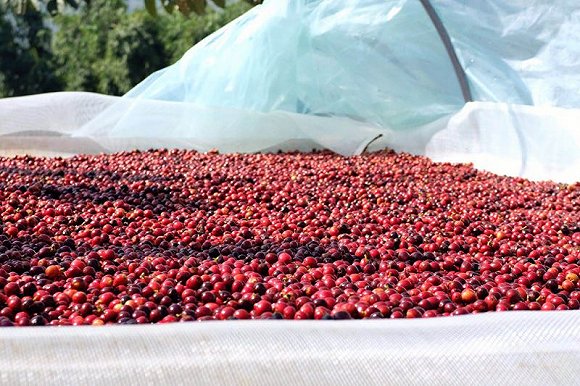
Boutique coffee needs all red fruit picking (photo source: Shen Xuejing)
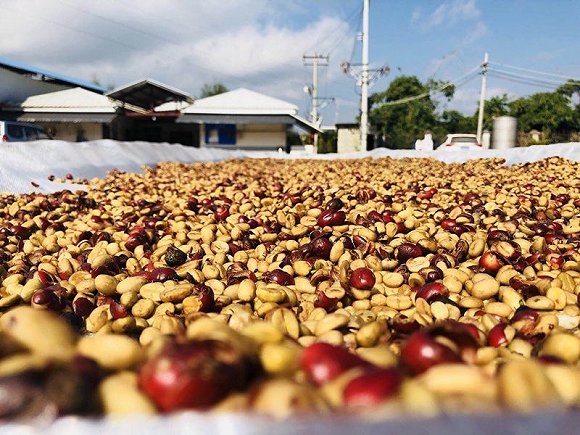
Sun treatment of boutique coffee (photo source: Shen Xuejing)
Shen Xuejing also needs to carry out experiments on these processes repeatedly when she is trained in the treatment of raw coffee beans in Pu'er. In the course of the same period, a nearly 60-year-old farmer gave up several times in the middle of the course, "you can't finish it at all. Such a complicated tool is too troublesome."
Li Xinhua has the same hesitation, and he and other farmers often talk about whether to make high-quality products.
"after spending so much manpower and effort to do it, you may not be able to do it well in the end. You think you have done a good job, so take it to a bean dealer and they say it is not a boutique, and it has not yet reached the standard of a boutique." He said. Li Xinhua has two children, and it is not a problem for his family to lead a decent local life according to the current mode of operation-he has set up a private house there by growing coffee beans and bought a car.
However, if Pu'er wants to produce high-quality coffee, it must pay special attention to the processing links such as washing or tanning.
Because in the era when Nestle dominated the producing area, farmers planted a single variety of Katim. The flavor of this variety is not unique and needs some special treatment to give it rich taste. For farmers, they have to pay a multiplying amount of time and labor.
In order to harvest high-quality coffee beans to his satisfaction in Yunnan, Chen Danqi and his team made nearly 100 trips to and from Yunnan.
Chen Danqi is the global head of the raw bean program for boutique coffee brand Seesaw. The main task of this job is to search for and customize boutique coffee beans that meet Seesaw quality standards around the world. Chen Danqi has been to Panama, Colombia, Guatemala and other world-famous coffee producing areas. Before his first arrival in Yunnan in 2013, he had been hearing that the industry generally did not believe that Yunnan had so-called boutique coffee.
But when he arrived, he found that Yunnan actually had a lot of potential, but lagged behind in terms of information and technology. So he chose a manor to ask the other party to follow a strict boutique coffee production process, eat and live in the manor with the farmers, and handle the coffee together. Chen Danqi found that if it operates according to certain norms, Yunnan can also produce boutique coffee that meets the market demand.
However, when he left Yunnan and returned to Shanghai, the quality of coffee beans sent from Pu'er plummeted, which was completely different from that achieved when he was stationed on the manor.
"then I found that it was not enough to ask them." He said, "in fact, technological change is not difficult, because the crux of the real problem is not just technological innovation, but also cognitive innovation."
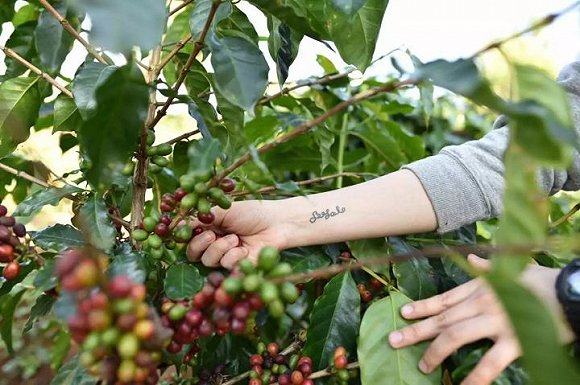
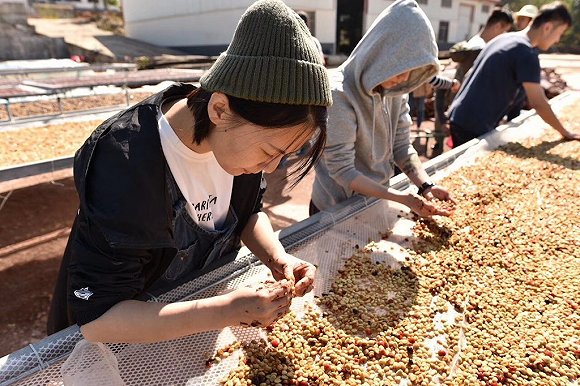
Seesaw team deals with coffee beans with farmers in Pu'er area.
Later, Chen Danqi, with the support of Zong Xinkang, founder of Seesaw, launched a Yunnan project. He defined the core basis of the plan as "common values", based on a common understanding and working together to change the future of Yunnan coffee. He and his team come to Yunnan in turn, communicate with different estates, spend a lot of time with growers, train them to understand the needs of the market, and learn to identify the quality of coffee beans. They also use the treatment they have learned in other coffee in the world to optimize the flavor of Yunnan boutique coffee beans.
Seesaw also collates all the information and processing methods into books and sends them to farmers. There is a detailed treatment process on each page, and temperature and humidity detectors, sweetness meters, and instruments for measuring soil acidity and alkalinity are sent to farmers. Because the most important thing is that these growers realize that the higher the quality, the higher the price-the company will buy any coffee beans produced according to the line Seesaw; the price is around 40 yuan, and the particularly good quality has a higher premium.
This boutique coffee brand has worked with a total of 33 estates here, and this year it has selected six estates for more in-depth cooperation. In addition to the coffee beans used in their own stores, they have also begun to export, bringing Yunnan coffee to the world.
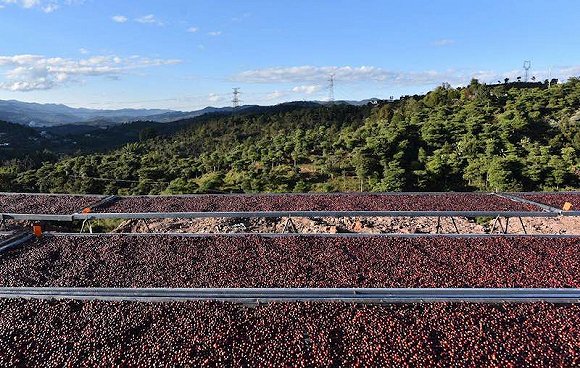
Seesaw's local cooperative manor in Yunnan
"but not every buyer will do that." Said Hou Ye, negative production manager at Torch Coffee Lab. "Seesaw is serious about it. But with more raw beans, I can buy better raw beans in the international market at the same price. Why spend the cost of time on educating farmers? "
Hou Ye, who worked on raw coffee beans in Beijing in 2015, came to Pu'er to study. Then she decided to join Torch--, which was founded by American Samuel Gurel. The barista, who is engaged in raw bean processing, is also optimistic about Yunnan coffee and moved here.
If the information is exchanged and the concept of Ka Nong is changed, Hou Ye believes that the quality of Yunnan boutique coffee can be improved rapidly. Because when she conducted a cup test in 2015, she found that there were still many defects in the flavor of Yunnan boutique coffee, but now when she drinks it, she has obviously felt the difference.
Torch not only does raw bean processing in Pu'er, but also conducts course training, including raw bean processing, baking and so on. In Pu'er, such training institutions are gradually increasing. There are also many big names from the international coffee industry here. For example, Ted Lingle, co-founder of the American Fine Coffee Association (SCAA) and the Coffee quality Research Institute (CQI), has been paying attention to Yunnan Coffee since 2014. As a judge of Pu'er Raw Bean Competition, and then as a senior consultant of Yunnan Coffee Trading Center, he helped Yunnan Coffee complete its docking with SCAA and CQI.
But these messages are still difficult to reach the ears of ordinary farmers.
Hou Ye found that the people who came to class were basically boutique coffee practitioners in first-tier cities such as Shen Xuejing, who went to the producing area to learn more about the coffee supply chain, and young people who owned coffee estates at home. they identify with boutique coffee more than their parents.
A young man who grows coffee
Starbucks may be able to take advantage of big companies here.
The company did not turn a blind eye to the third coffee. On March 1, 2018, Starbucks opened its first selected store in Seattle-a high-end coffee brand run by Starbucks founder Howard-and other boutique coffee shops billed as single-origin hand-brewed boutiques. In December 2017, when Starbucks opened its bakery in Shanghai, Yunnan coffee appeared among the selected brands for the first time.
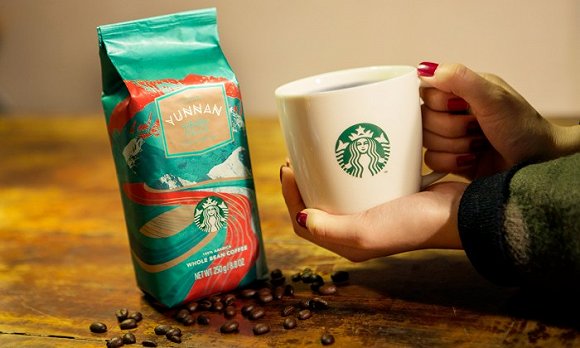
In addition to the selection series, Starbucks also launched a single origin of Yunnan coffee beans.
The Starbucks Cafe support Center also encourages Pu'er farmers to try to grow boutique coffee in small quantities and earn more at higher prices.
Tong Aaron and his team have been experimenting with various boutique coffee processing methods that meet Starbucks standards in Pu'er. And it plans to train 4,000 to 5,000 coffee farmers on boutique coffee at the Starbucks Coffee suppliers Conference in 2018-a similar event for coffee farmers, thanking and commending farmers who have cooperated in the past year. It has been held three times in a row, with more than 4000 people participating last year. In 2018, Yunnan coffee beans will continue to appear in the Zhenxuan series after being processed in a richer way.
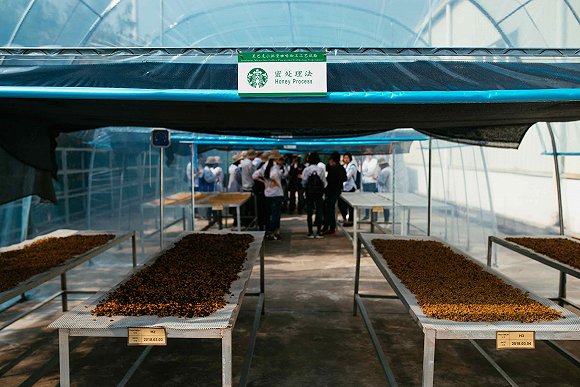
Starbucks is experimenting with coffee honey treatment in Yunnan
The scale advantages of large companies are not limited to this.
The most important problem for Yunnan boutique coffee beans to solve is the branding of products-names that often appear on the menus of boutique coffee shops such as Colombia, Guatemala and Manila. At present, Yunnan's boutique coffee beans are mostly used to match with other coffee beans to make up for its lack of flavor.
Even in Shanghai, a city where boutique coffee already has a certain scale, only a few boutique coffee stores use Yunnan coffee beans from a single origin.
"now Yunnan coffee beans are one of my favorite beans." Lindsay said. She is from Italy and runs a boutique coffee shop called volcan on Yongkang Road in Shanghai. This is also one of the earliest boutique coffee shops in Shanghai. "the flavor is well balanced with some nutty and fruity aromas."
Seesaw has also promoted Yunnan-made coffee in stores, which is one of the brand's popular single-origin hand-brewed coffees. According to Shen Xuejing's observation, at least in the Shanghai market, the acceptance of single coffee beans from Yunnan is not very high.
But just like cold coffee, Flat white-- Starbucks is called Frappy White-these coffee products are of the same quality, and when Starbucks starts to promote them, their awareness will increase immediately. Most of the time, when you hear an order from a customer in a boutique coffee shop, you will habitually refer to Flat white, a coffee making method from Australia, as Furebai.
Although boutique coffee practitioners tend to disdain large companies, in terms of business strategy, Starbucks will undoubtedly accelerate its reputation in the coffee market if it replicates this advantage of scale to Yunnan Pu'er boutique coffee.
But in addition to young people from big companies and boutique coffee brands who come to Pu'er who want to do a big job, there is a group of people who may be more able to influence the fate of Yunnan boutique coffee.
Dakaihe Village is located on the border of Pu'er and Xishuangbanna. This small village is also covered with coffee trees.
Hua Runmei came back here after graduating from college in 2015. Her father owns a coffee estate here. Hua Runmei is the youngest farmer in this village. She has personally experienced the development of fine coffee in Yunnan, but because of the lack of information, the fine beans planted by many farmers are not recognized by the market.
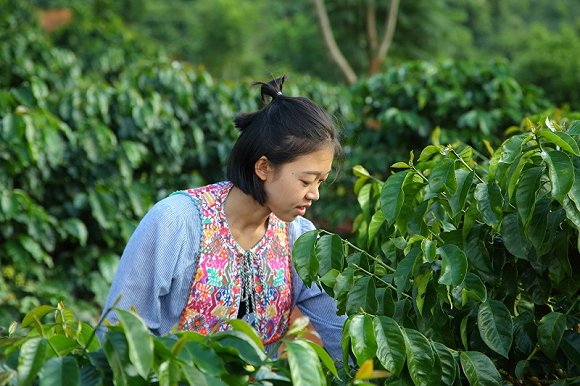
Huarun Mei is a young Yunnan farmer
"Many buyers who come to train are just spreading the technology and ignoring the local reality, resulting in beans being rejected as substandard." The other is that local coffee farmers are confused by the high price of coffee and start making large quantities without market connection." She told the interface news,"The boutique industry in the past two years really encountered various problems in Yunnan, many farmers just look but dare not do it."
Therefore, CR Mei decided to learn the knowledge of fine coffee by herself, and then went down to coffee estates and factories to practice with coffee farmers. She is "one of us" and local coffee farmers are more likely to trust her and accept the concept of boutique coffee. People call her "plum"-a name that has become somewhat famous in Yunnan fine coffee circles.
In Pu 'er, the "second generation of coffee" with ambitious ambitions for fine coffee began to emerge continuously. They can try it on their own farmland, know how to communicate with market practitioners through Social networks, and understand that after the "third coffee wave" affects the Chinese market, it will eventually bring huge first-mover advantage to Yunnan coffee.
"The most important thing to promote Yunnan fine coffee is the market demand, and then a series of promotion and attention from some professional coffee training institutions and the government in Pu 'er." "It's important for young people," she said."We don't have as much difficulty communicating with the outside world as our parents do. There are more ways to learn something new about coffee."
Change has begun to emerge.
CR Mei will also hold cup test activities in Dahe Village from time to time, inviting nearby farmers to participate. In fact, these coffee farmers never drink coffee. When they first came into contact with coffee, CR Mei was impressed by the contradiction between timidity and curiosity. But after a time or two, the farmers fell in love with coffee. Now they come to China Resources Mei's house and must have a cup of coffee.
Li Xinhua also set up a simple "coffee shop" on the edge of his manor, directly grinding coffee and brewing hot water. In 2016, he was invited by Starbucks to Chengdu to participate in Starbucks 'Partner Family Day and went to Chengdu Swire Flagship Store, the largest Starbucks store in Southwest China.
"I saw a lot of people queuing up for coffee and thought we have a lot of coffee there." he said.
After a cup of barista hand-brewed coffee, he had to admit,"Well, it's better than ours."
Important Notice :
前街咖啡 FrontStreet Coffee has moved to new addredd:
FrontStreet Coffee Address: 315,Donghua East Road,GuangZhou
Tel:020 38364473
- Prev

Classic Vietnamese Coffee recipe course which is the best brand of Vietnamese coffee beans
Professional coffee knowledge exchange more coffee bean information please follow the coffee workshop (Wechat official account cafe_style) Vietnamese coffee _ Vietnamese coffee prices _ Vietnamese coffee brand French colonization of Vietnam left traces, but not limited to Vietnamese sandwiches used in French bread and meat sauce (pt), Vietnamese coffee that many people flock to is also another classic. Serious
- Next

Ethiopian Coffee Bean Brand recommends Yega Xuefei Coffee how much is a cup?
Professional coffee knowledge exchange more coffee bean information please follow the coffee workshop (Wechat official account cafe_style) boutique coffee beans Yega Sheffei Coffee beans, the earliest definition is produced in Ethiopia, a coffee bean called Yejashafi town. Most coffee fans may be interested in Ethiopia.
Related
- Detailed explanation of Jadeite planting Land in Panamanian Jadeite Manor introduction to the grading system of Jadeite competitive bidding, Red bid, Green bid and Rose Summer
- Story of Coffee planting in Brenka region of Costa Rica Stonehenge Manor anaerobic heavy honey treatment of flavor mouth
- What's on the barrel of Blue Mountain Coffee beans?
- Can American coffee also pull flowers? How to use hot American style to pull out a good-looking pattern?
- Can you make a cold extract with coffee beans? What is the right proportion for cold-extracted coffee formula?
- Indonesian PWN Gold Mandrine Coffee Origin Features Flavor How to Chong? Mandolin coffee is American.
- A brief introduction to the flavor characteristics of Brazilian yellow bourbon coffee beans
- What is the effect of different water quality on the flavor of cold-extracted coffee? What kind of water is best for brewing coffee?
- Why do you think of Rose Summer whenever you mention Panamanian coffee?
- Introduction to the characteristics of authentic blue mountain coffee bean producing areas? What is the CIB Coffee Authority in Jamaica?

